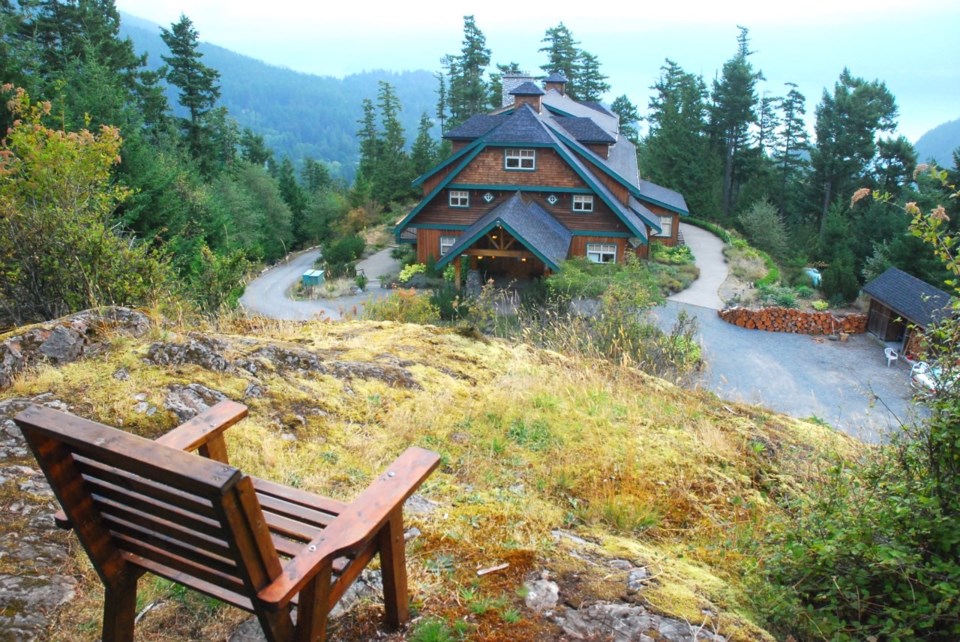Often it starts with a leg-burning, lung-busting trudge up Cates Hill, following the road spiralling up into the trees to the lodge perched above Snug Cove.
And then quiet.
From the hand-drawn floor plan given to developer Wolfgang Duntz back in 2001 when he met with founders Howard and Shirley Bentall, to a thriving retreat centre hosting thousands of guests a year, even as a success story, Rivendell Retreat Centre is something of the antithesis of modern capitalist bustle. Guests pay what they can and the operation is run entirely on volunteer power. WiFi is available in some places but unplugging is encouraged. The centre has consciously flown under the radar, even in a community as small as Bowen.
Eighteen years into its existence, the Christian-based but all-welcoming retreat space, is “revisioning” its future.
Rivendell started as just the lodge, built in just 18 months two decades ago. It’s 18 rooms, a big and a small kitchen (uncertified to keep costs down, groups or individuals provide their own food), library, nooks, reading rooms and a view over the North Shore mountains that would make Elrond himself envious.
At this hilltop property, Rivendell has since added the Cottage, a two-bedroom building set a hundred metres or so away from the lodge meant for respite for families who wouldn’t otherwise be able to afford to get away. On this property, there’s also the sanctuary. Mimicking the spiral of a nautilus shell, the sacred space is open to guests as well as the Bowen public.
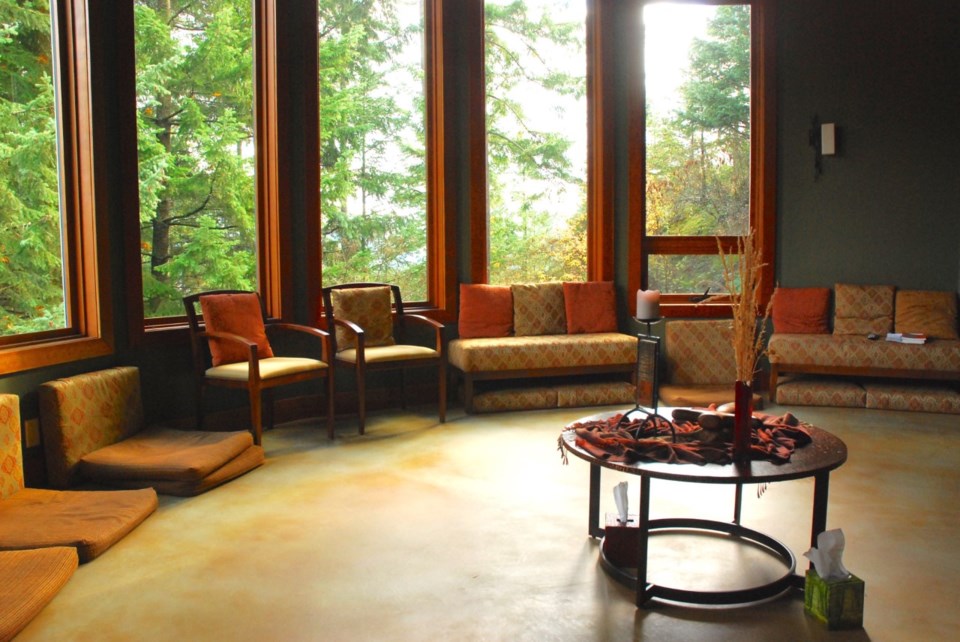 The Sanctuary on Cates Hill was built a few years back in the spiraling shape of a nautilus shell. By Cherie Westmoreland
The Sanctuary on Cates Hill was built a few years back in the spiraling shape of a nautilus shell. By Cherie Westmoreland
“For our first 18 years, what we offered was space,” says Kathi Bentall. The daughter of Shirley and Howard helped found Rivendell and remains among the leadership team volunteers.
The organization itself didn’t offer much in the way of programming but groups and individuals came to use the serene setting for spiritual retreat.
When guests call to book space at Rivendell, it’s made clear that this is not a bed and breakfast, a girls weekend trip location or a wedding venue; it’s a place for reflection, contemplation and quiet. “Such a rare thing in our society,” comments Kathi.
About six years ago, through some agreements with Bowen Island Properties (the same developer that donated the Cates Hill property) the Rivendell Foundation got its own slice of Mirkwood. The Hermitage, a quiet property out near Fairweather, entirely in the woods with a view of the ocean through the gaps in the trees, has a main building with basic facilities and then “Hobbit paths” to five unserviced mini cabins, each with a bed, a small wood stove, a table and chair. Particularly at this location, they’re seeing people desperate to be unplugged, says Kathi.
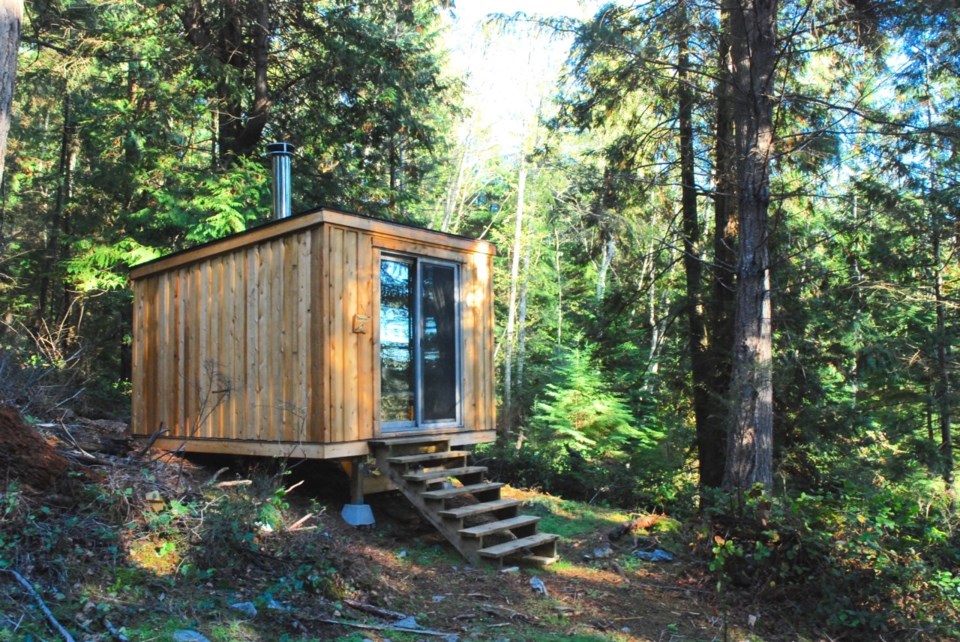 Unserviced mini cabins out at the Hermitage allow visitors to unplug. By Cherie Westmoreland
Unserviced mini cabins out at the Hermitage allow visitors to unplug. By Cherie Westmoreland
In just the past year, the organization has added a writer’s retreat at a separate Cates Hill location, where one applies to use the space (rather than it being simply bookable).
Rivendell’s fifth site is the Listening Post at the corner of Main and Hastings Streets in downtown Vancouver. “It’s a quiet oasis,” describes Kathi, who was also involved in the volunteer-run space’s opening in 2000. There was a need for a place to meet with people in the Downtown Eastside, where such places are far and few between. “It’s been, again, a very simple space just to provide a place for people to pause and listen to their own inner wisdom.”
Kathi was already offering retreats for people in the Downtown Eastside, going to other nearby retreat centres, when she and her parents launched Rivendell. The retreats moved to Rivendell and the connection between people living downtown and the Bowen organization grew. The Listening Post now falls under the Rivendell umbrella.
“There’s something really grounding in that we’re connected with the inner city as well,” says Kathi. “It just makes a lot of sense.”
From the beginning, a tenet of Rivendell’s model has been pay-what-you-can. “When we first started, it was pretty radical,” says Kathi. “But you know, we’ve been in the black.
“I think because people who can pay more respond to that principle of generosity and give additional donations and those who can’t don’t have to ask for special favours.
Creating intention
“This is just a building,” Margie Savigny gestures at the lodge. She’s also part of Rivendell’s leadership team and joined the retreat community about 13 years ago. “In order to make a building have an intention, someone has to be here to offer that intention.
“The host has an intention to bring people into community with that sense of silence and prayer.”
An experienced volunteer – the host – stays at the space and can often offer spiritual companioning, a listening ear. They also lead a daily 8 a.m. prayer for anyone at the lodge or in the broader Bowen public and a 5 p.m. gathering.
While no one coming to Rivendell or to the prayers or gatherings needs to be Christian, the hosts are. “It’s not by any means a place of conversion or intentional offering of our religion. But it is a time where we bring that intention of our Christian way of life. And we just hold it,” says Margie.
Rivendell has traditionally had four values – prayer, silence, hospitality and simplicity.
“Our own personal journeys bring us to know the value of silence and prayer, simplicity and hospitality,” says Kathi. It was discovering a place of silent retreat that helped Kathi heal following a “very, very dark time” in her life in the early ’90s.
“Just the opportunity to pause and work through my anger at what all had gone on in my life and then to find another voice,” she says. “That inner voice, and you can call it the still small voice of God, you can call it wisdom. There are so many different words for that.”
“But it was so healing for me and life-giving,” she says. “From that point on I thought, this is what the world needs.
“A space for prayer. For some silence, simplicity – it needs to be just simple, not complex – where they’re received with hospitality and welcomed, whoever they are.
With the revisioning, Rivendell has added a new core value: social action. “Just knowing that once we regroup, we’re refreshed, that we have our action in the world,” explains Kathi, “And we can come back to it with much more clarity.
“Not just act in the world out of our woundedness but act in our world out of ‘Okay, this is what I need to do.’”
Kathi gives the example of the environmental movement – how do we make change that’s effective? “So often I think we are spinning our wheels and not willing to actually do the hard work inside.”
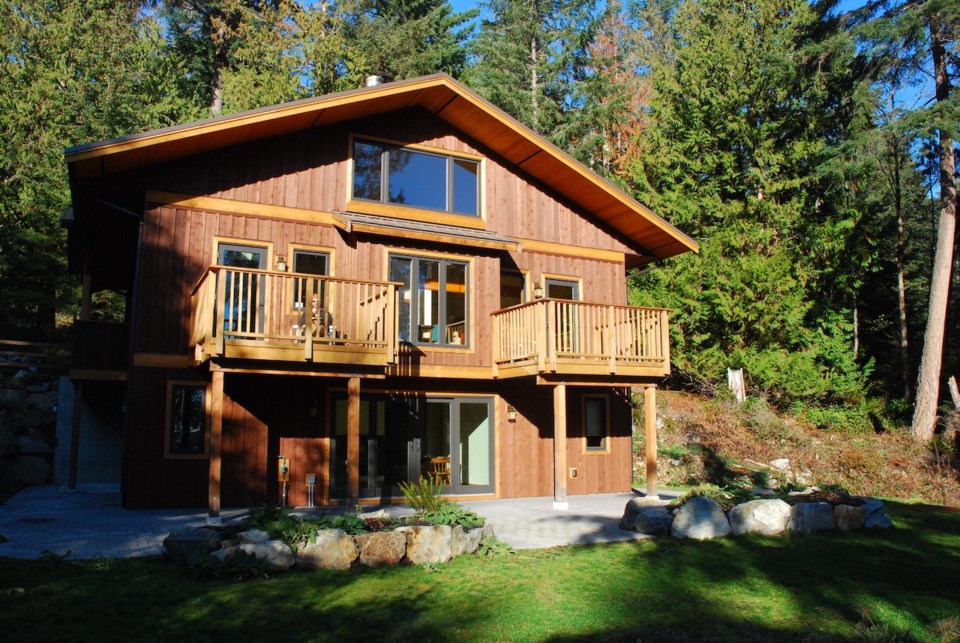 The main building at the hermitage has a couple of room and cooking facilities as well as an art room. By Cherie Westmoreland
The main building at the hermitage has a couple of room and cooking facilities as well as an art room. By Cherie WestmorelandA new vision
The volunteer community and the role of hosts have been key to the Rivendell model.
A host would come for a week or five days and then tag off their successor. “It worked really well, probably for about 15 of the 18 years,” says Kathi.
With the addition of the Hermitage, the Rivendell crew began to feel that the retreat centre was growing beyond its entirely volunteer model. They were also having a tough time attracting volunteers – it’s no small feat to move people through the 18-bed lodge, which pre-pandemic was running at 90 per cent capacity, dealing with comings, goings, bookings and cancellations.
So came the revisioning.
Last year, local professional facilitators Chris Corrigan and Caitlin Frost led the intensive revisioning, including in-depth interviews and discussions with the community and its visitors.
Where in its first decades, Rivendell has provided space for individuals and other programs’ groups, the organization heard that visitors wanted some leadership on their contemplative journeys. So Rivendell will offer some support for “people who really want to be nurtured in that way of living life with much more intention and listening from a deeper place,” says Kathi. “So the vision shifted to nurturing and supporting contemplative life and tending our sacred sites.”
Where the five Rivendell sites have been operating with some independence, the revisioning saw them all coming more fully under the same umbrella.
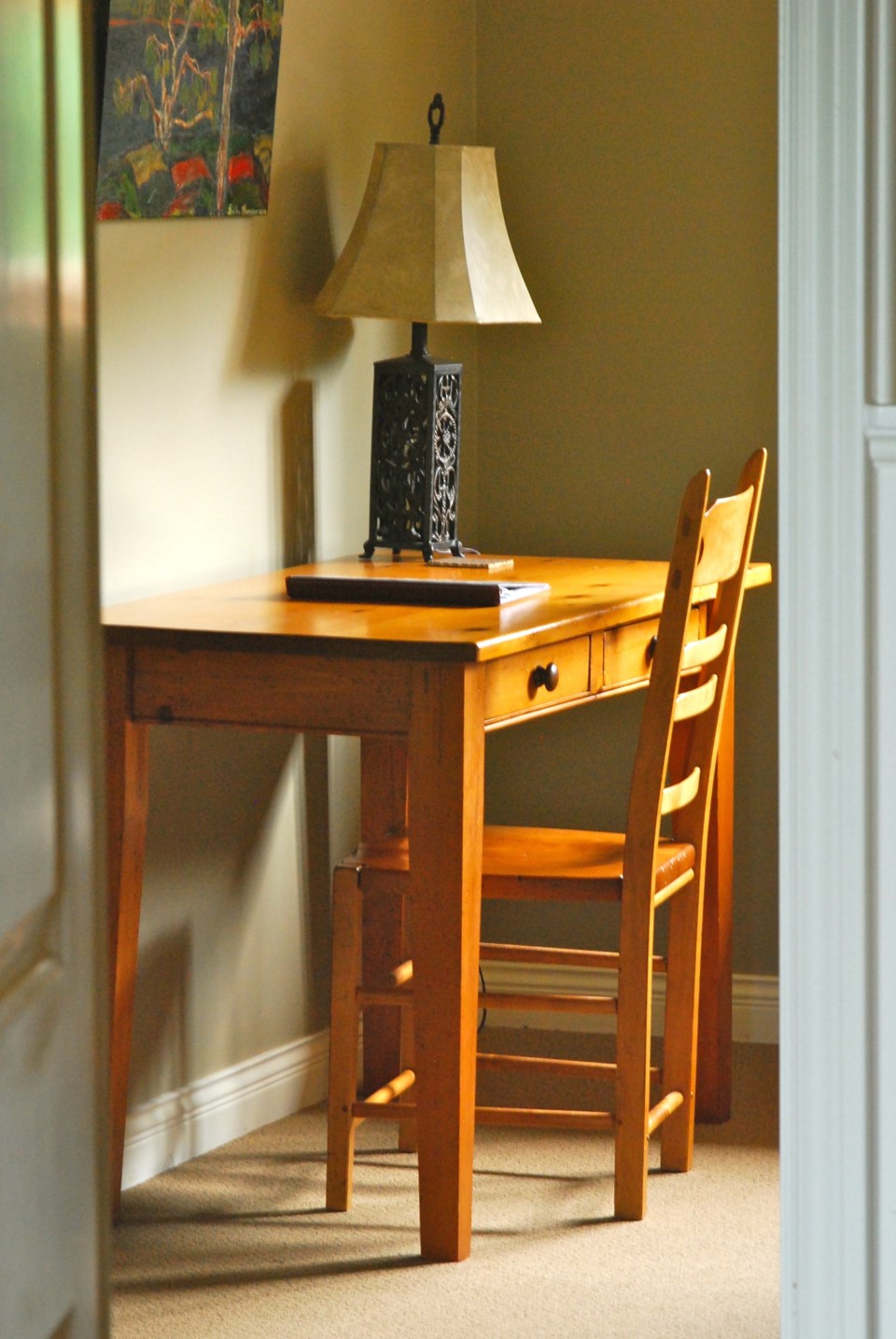 In regular times, Rivendell is often at 90 per cent capacity. By Cherie Westmoreland
In regular times, Rivendell is often at 90 per cent capacity. By Cherie Westmoreland
In the earlier days of Rivendell, a core community of 10 to 12 volunteers made up the host roster. “We really had quite a connection among us,” says Kathi. But the operation got bigger, adding the Hermitage and more hosts, diluting the sense of support among hosts. So, with the revisioning, volunteers are organized into journey groups – six or seven people supporting one another – and every journey group supports one of the five sites. Most of the journey group members are from the Lower Mainland, though some are from farther afield, including the Okanagan.
If one doesn’t want to commit to being in a journey group, they can also contribute funds or time as a friend of Rivendell.
Another major change with the new vision is that Rivendell is getting its first employee. A paid employee will oversee maintenance, supplies, functioning (though volunteers will still handle booking). “We’re excited to be able to offer that to somebody,” says Kathi.
This year is about “living into” the new vision and then next year, the new slate of retreat offerings are to start.
But of course, the pandemic also has much up in the air. While Rivendell is currently closed until after the May long weekend due to the “circuit breaker” restrictions, for the past year, it’s been booking at half capacity, with only seven to nine people in its lodge.
Traditionally, the 5 p.m. bell has rung at the lodge, marking the time for the daily gathering in the sanctuary. Today, while gathering is prohibited, the bell still rings. “People on the island have told us, especially during COVID, please don’t stop ringing the bell,” says Margie. “It is a bit of a beacon.”
